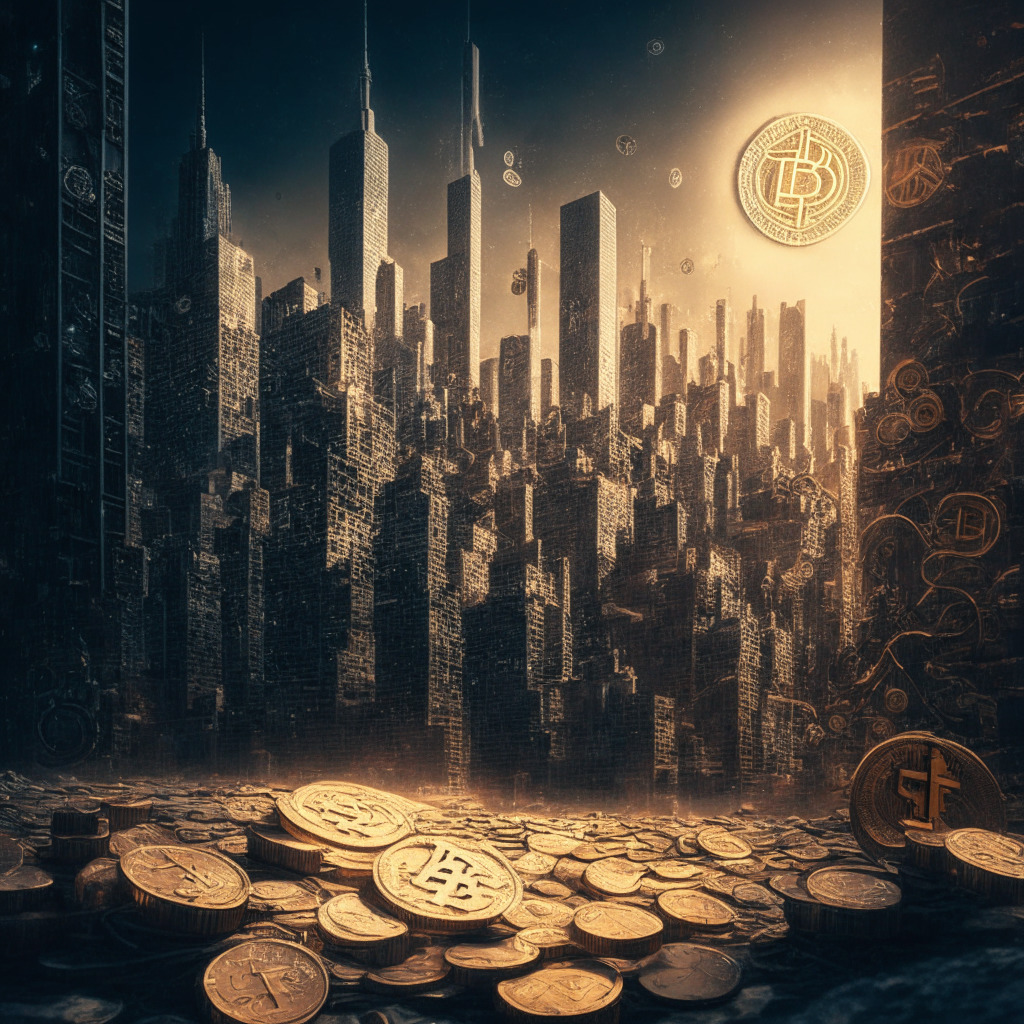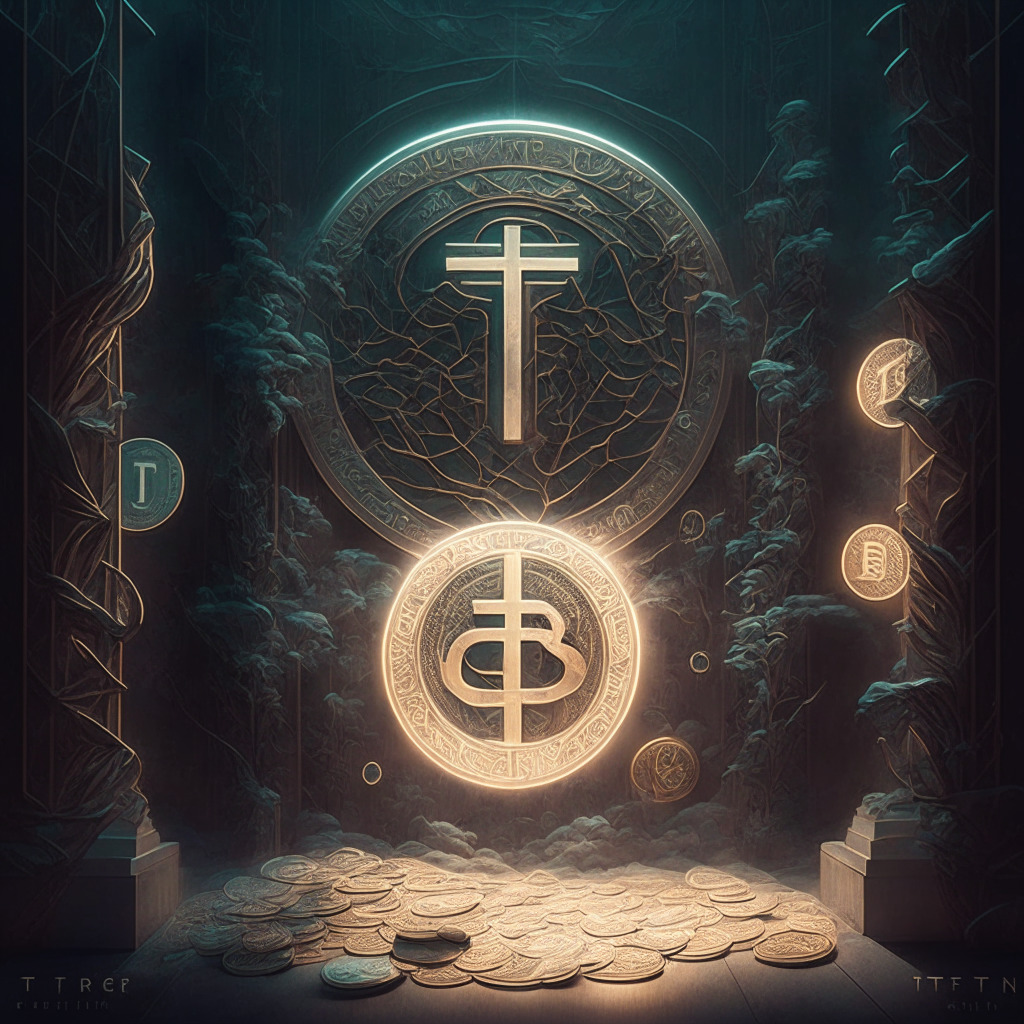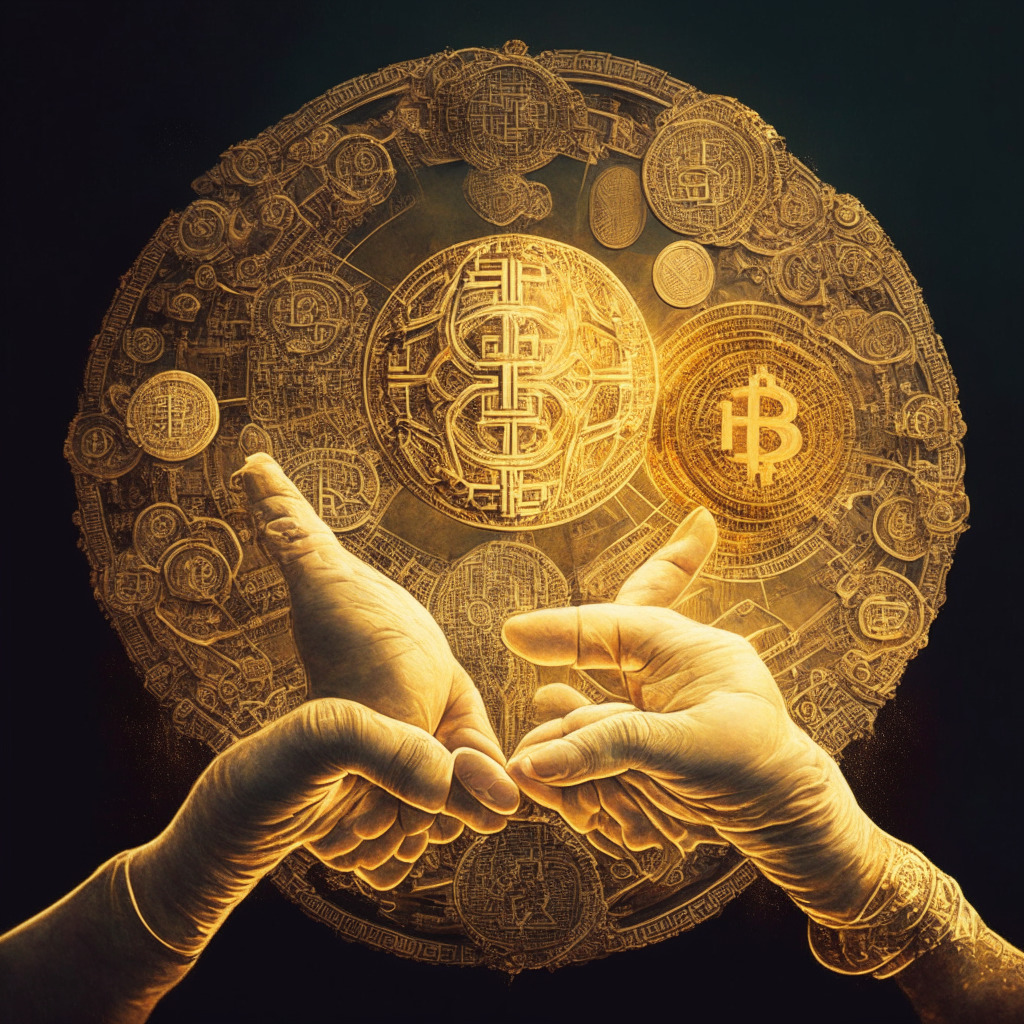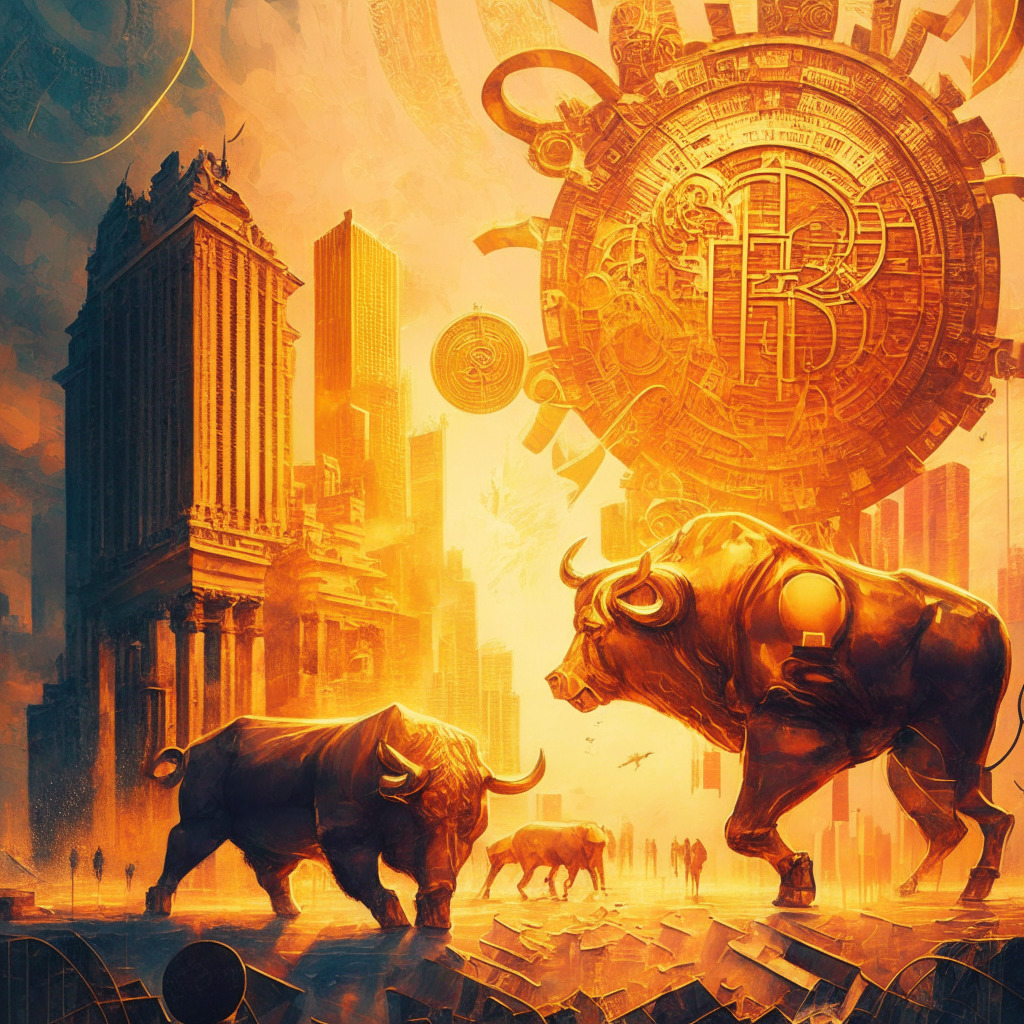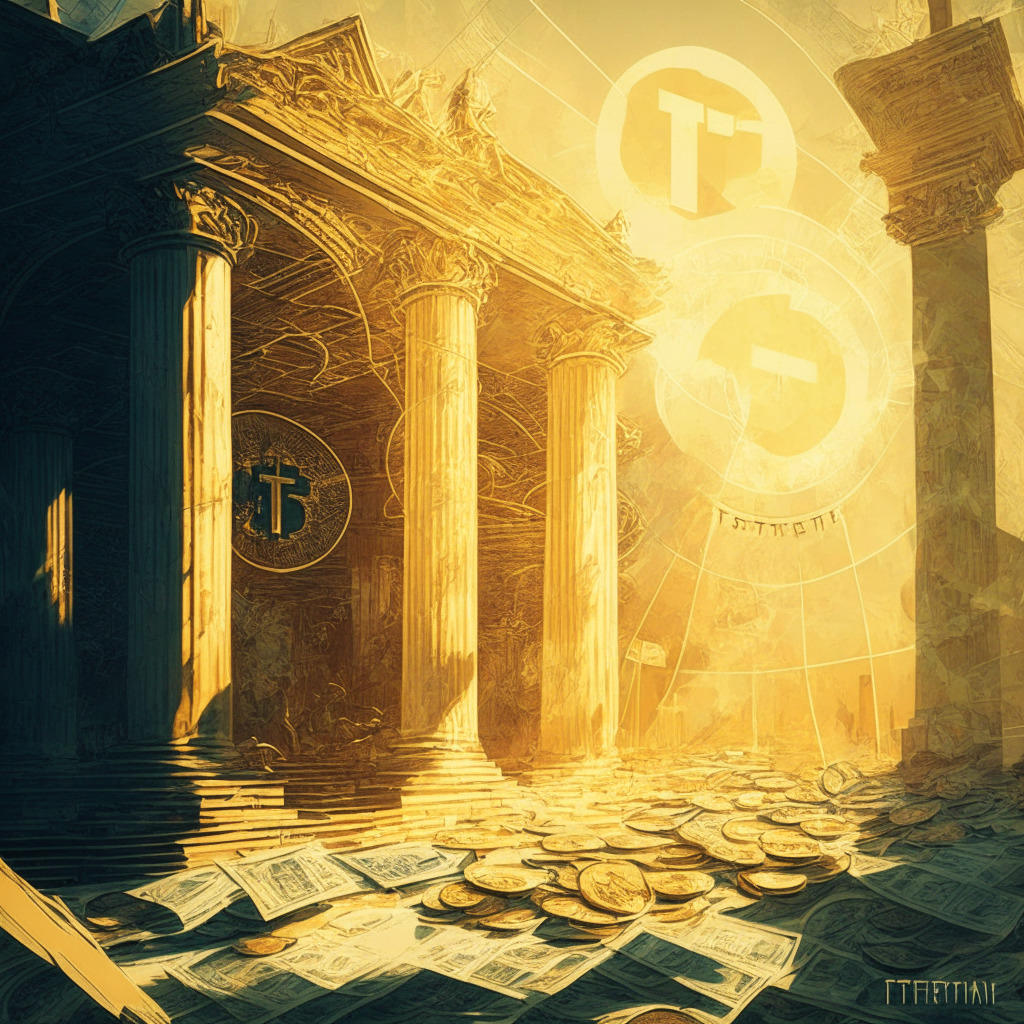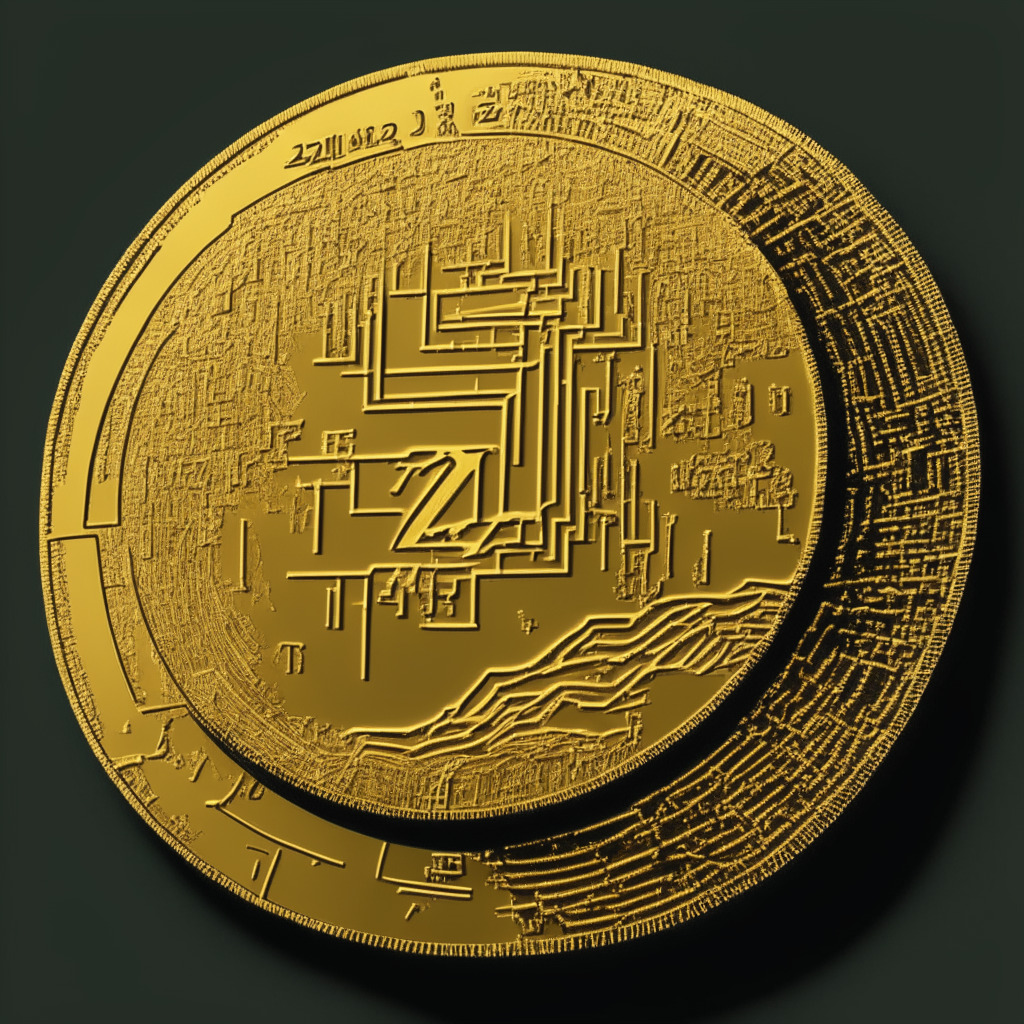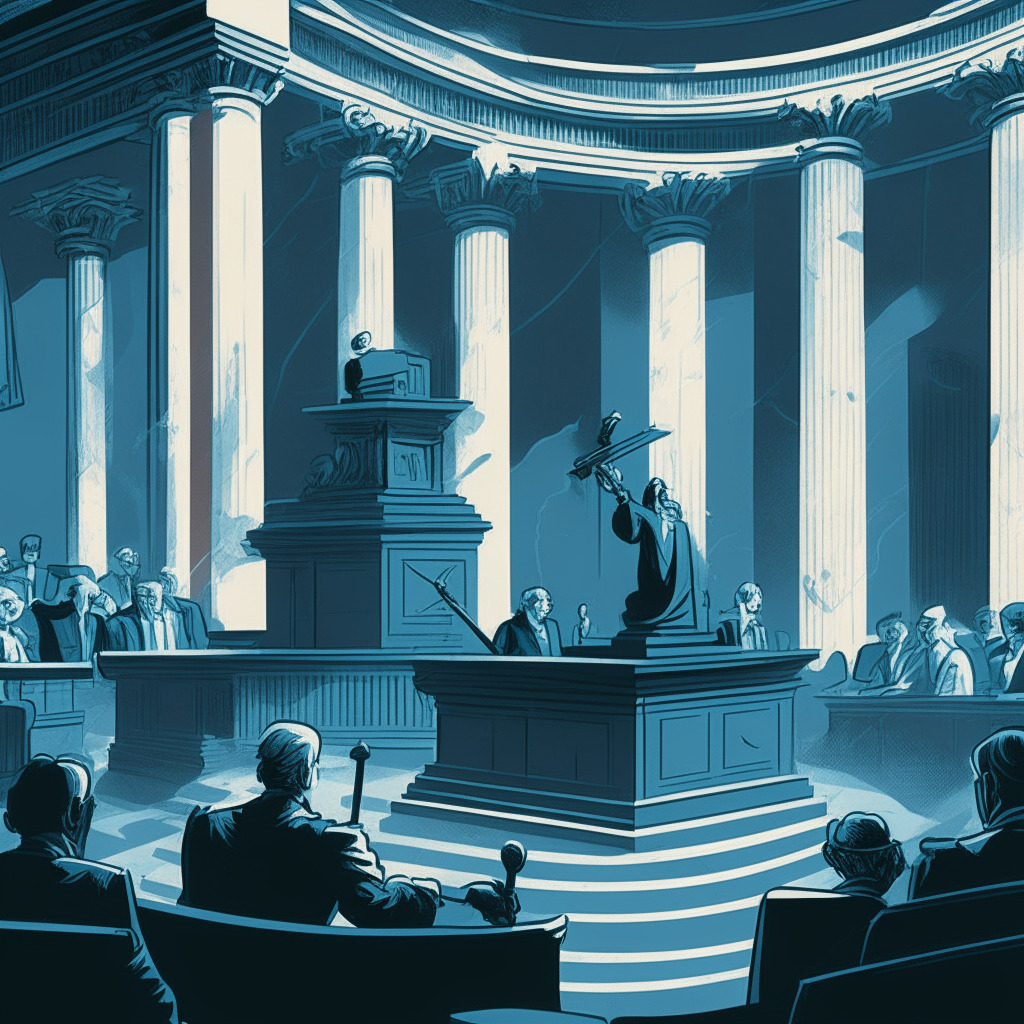Tether plans to buy bitcoin regularly with its $1.48 billion surplus profits, following BDO Italia’s robust attestation. Aiming to de-risk from the US dollar and align with transformative technology, Tether’s move raises questions about the implications for its main product, USDT, amidst an unclear regulatory landscape.
Search Results for: Tether
Stable Bitcoin Amid US Debt Crisis: Tether Influence and USD’s Impact on Crypto Market
Bitcoin experiences a modest 1.5% gain as market sentiment gets a boost following President Biden’s confidence in resolving the US debt crisis. Tether’s commitment to purchasing Bitcoin may contribute to recovery, but the strengthening greenback and bearish outlook may provide hurdles.
Bitcoin Struggles at $27,500: Tether’s Impact, Korea’s Regulations, and Pakistan’s Ban
Bitcoin struggles to overcome the $27,500 resistance level amid a downward trendline, while Tether plans to purchase Bitcoin to diversify its reserve holdings backing USDT. Meanwhile, Korean politicians unite for crypto regulations, and Pakistan enforces a ban on cryptocurrency services due to FATF requirements.
Tether’s Bitcoin Investment Strategy and Emerging Crypto Projects: Navigating a Dynamic Market
Tether announces plans to allocate up to 15% of its reserves to invest in Bitcoin, citing its robustness and growing popularity. Meanwhile, innovative projects like AiDoge, Conflux, and ecoterra reflect the dynamic nature of the cryptocurrency market. Investors must stay vigilant and make informed decisions to capitalize on this growth.
Tether’s Bitcoin Investment Plans: Confidence in Growth or Transparency Issues?
Tether plans to allocate up to 15% of its net realized operating profits towards investing in Bitcoin, citing its resilience and growth potential. However, concerns over transparency and underlying assets backing stablecoins persist, with some critics questioning Tether’s $1.5 billion worth of Bitcoin reserves.
Ripple Acquires Metaco, Tether’s New Strategy, and the Latest in Crypto Markets and Regulations
Ripple acquires Swiss-based Metaco for $250 million, expanding enterprise offerings and accelerating Metaco’s growth. Tether announces 15% net realized operating profits to be allocated towards Bitcoin purchase for reserve diversification. Meanwhile, Coinbase expands services in Singapore and China issues guidelines for NFT treatment.
Tether’s 15% Bitcoin Investment: Pros, Cons, and Future of Stablecoin Regulation
Tether plans to invest 15% of its net profits in Bitcoin to strengthen and diversify its reserves, demonstrating the company’s confidence in the cryptocurrency market. As US lawmakers discuss potential stablecoin legislation, Tether’s bold move could potentially shape the future of the industry.
Tether Boosts Reserves with Bitcoin: Bold Move or Risky Strategy?
Tether plans to strengthen its reserves by investing in Bitcoin (BTC), moving away from US-based government debts. The stablecoin issuer will regularly allocate up to 15% of its net realized operating profits towards purchasing Bitcoin, citing its limited supply, decentralized nature, and widespread adoption as key factors for the decision. Tether’s approach is similar to Microstrategy’s strategy of replacing the U.S. dollar with Bitcoin in its reserves.
Tether’s Bold Bitcoin Investment Strategy: A Wise Choice or Risky Gamble?
Stablecoin issuer Tether plans to allocate up to 15% of realized earnings for Bitcoin acquisition, diversifying its reserves. Skepticism arises over Tether’s choice to self-custody its holdings. The company’s continued investments signal confidence in cryptocurrency’s success and growth, but self-custody concerns persist.
Tether’s Bold Move: Diversifying Reserves with 15% Bitcoin Investment Strategy
Tether plans to allocate up to 15% of realized profits from investments to purchase Bitcoin, aiming to diversify and strengthen its stablecoin reserves. This follows Tether revealing $1.5 billion in BTC and $3.4 billion in gold held among its reserve assets.
Tether’s $4.5B Bank Withdrawal: Reducing Risk & Boosting Crypto Stability
Tether Holdings strategically reduced bank deposits by 90%, withdrawing $4.5 billion and increasing holdings in US Treasury bills. This resulted in an 85% backing for USDT through cash and short-term deposits, while improving transparency and demonstrating the potential of stablecoins in the crypto space.
US Losing Stablecoin Dominance: USDC’s Struggle and the Rise of Tether Threatens Digital Economy
The US may be losing ground in the digital economy as USD Coin (USDC) faces strong competition from Tether (USDT). This shift could undermine US control and expose the Web3 community to less-regulated forces. Policymakers must prioritize Web3 and stablecoins to ensure America’s influence in the digital economy.
Soaring Profits for Tether: Stablecoin Industry Boom and USDT Token Holder Concerns
Tether reported a record profit of $1.48 billion in Q1 2021, attributed to rising interest rates and diversifying its reserves with physical gold and Bitcoin. The stablecoin issuer sees a 20% increase in token circulation, reflecting growing customer trust. However, concerns arise as USDT token holders receive no interest, and companies need to balance profits and customer interests for sustainable growth.
Tether’s Bitcoin and Precious Metals Investments: Transparency Boost or Market Risk?
Tether’s recent attestation report reveals approximately $1.5 billion worth of Bitcoin, accounting for nearly 2% of its total reserves. The inclusion of Bitcoin and precious metals, totaling $3.4 billion, aims to enhance transparency for USDT stablecoin holders. However, concerns arise about potential risks due to market fluctuations.
Tether’s Record Profits Amid Transparency Concerns: An In-Depth Analysis of the Stablecoin Giant
Tether announced a net profit of $1.48 billion and a reserve surplus of $2.44 billion. As the company behind USDT, the largest stablecoin, Tether plays a vital role in crypto markets. However, it faces scrutiny over transparency in backing USDT with U.S. dollars and has faced controversies in the past.
Tether’s $1.48B Q1 Profit: Can Success Amid Transparency Concerns Sustain?
Tether reported a $1.48 billion net profit in Q1 2021 and disclosed its $1.5 billion Bitcoin and $3.4 billion gold holdings. Despite scrutiny, Tether’s USDT stablecoin remains a market leader. Increased transparency efforts include reducing secured loans in reserves and providing clearer information on reserve assets.
Tether’s Soaring Reserves: Sign of Trust or Reminder of Controversies?
Tether Holding Limited reported a significant increase in reserves, reaching an all-time high of $2.44 billion in Q1 2023. Despite past controversies surrounding transparency, Tether has enhanced efforts to provide regular attestations and maintain stability, emphasizing the importance of thorough market research before investing in cryptocurrencies.
Xapo Bank’s Tether Expansion: A Bold Move or Risky Business for Crypto Banking?
Xapo Bank plans to allow customers to deposit and withdraw USDT (tether) without fees by the end of the month, following a similar service for USD Coin (USDC). Despite concerns over stablecoin volatility, proponents highlight strong demand and Xapo’s commitment to emerging markets.
Gold Versus GambleFi: The Battle for a Safe Haven in Uncertain Economic Times
In the midst of global economic uncertainty, gold’s reliability shines while a gold token, XAUT, experiences a market rise implying a bullish sentiment. Emerging prospects like the TG.Casino, a GambleFi project, blending blockchain’s decentralised advantages with casino gaming, are gaining traction.
Unveiling Binance’s $1B Recovery Fund: Generous Aid or Strategic Maneuver?
“Binance’s $1B cryptocurrency recovery fund, the Industry Recovery Initiative (IRI), has reportedly invested only an estimated $30M since its inception, despite large capital commitment. With growing regulatory concerns, unused funds were moved to Binance’s corporate treasury, raising questions about the effectiveness of such recovery initiatives in the evolving blockchain industry.”
Unwrapping the Saga of Alameda’s USDT Mints & Zimbabwe’s Gold-Backed ZiG Tokens
“Alameda Research has minted over $38 billion in Tether (USDT) tokens in 2021, indicating that the total value of USDT creation surpasses Alameda’s total assets. The inner workings of this process involve benefiting from trade value discrepancies and ensuring USDT’s dollar peg stability. However, this raises ethical concerns for industry watchers.”
Hong Kong’s Regulatory Dilemma: The Price of Protecting Crypto Investors
“Hong Kong is taking steps towards limiting retail stablecoin trading among individual investors due to increasing crypto adoption. Stablecoins’ value is pegged to fiat currencies, providing some stability against crypto turbulence. However, the recent TerraUSD stablecoin collapse underscores the need for stringent regulation to ensure investor protection and maintain price stability.”
Canadian Securities Administrators Unveil Interim Framework for Stablecoin Issuers: Ensuring Safety or Stifling Creativity?
“The Canadian Securities Administrators (CSA) has unveiled a framework to guide exchanges and issuers of stablecoins, aiming to enhance transparency and trust. The rules require stablecoin issuers to maintain sufficient reserves with a qualified custodian and disclose crucial platform information, underscoring the need for investor information and protection.”
The Intricate Web of Illicit Fentanyl Trade Powered by Cryptocurrency
The U.S Treasury’s Office of Foreign Assets Control (OFAC) has targeted several cryptocurrency wallets involved in the illicit trade of fentanyl. Most transactions were conducted via Stablecoins on Ethereum and Tron networks. These wallets, save for one, were hosted on a centralized crypto exchange, allowing the illicit flow of hundreds of thousands of dollars worth of cryptocurrency.
Balancing Act: Supervising AI Vs. Regulating Cryptocurrencies – Who Gets the Upper Hand?
This article discusses a project launched by UNESCO and the Dutch government to study AI supervision across Europe, aiming to develop guidelines from best practices. It also highlights the contrast of some nations focusing heavily on AI regulations, while cryptocurrency protocols, such as for stablecoin transactions, are being neglected. The importance is stressed of striking a balance between embracing technological advances and ensuring proper regulation for consumer protection.
OpenAI’s Crossroad: In-House Chip Production versus Outsourcing amidst Global Shortage
Amid a global chip shortage, artificial intelligence firm OpenAI debates on whether to bring chip production in-house or continue working with chip suppliers like NVIDIA. This decision could present unprecedented challenges, but may also provide a pathway for managing technological advancements and supply scarcity in the broader tech industry.
Unmasking Shadows: Blockchain’s Flashy Evolution Amidst Ethical Challenges and Regulatory Needs
This article discusses the complex landscape of blockchain technology. It highlights misuse of power in crypto markets, efforts to foster secure trading conditions, potential tokenization of debt securities, the implication of decentralized prediction markets, and calls for comprehensive regulation and ethical self-governance in the crypto field.
The JPEX Saga: An Unsettling Dive into DAOs, Dividends, and User Authorisation Debacle
Cryptocurrency exchange JPEX’s controversial transition into a decentralized autonomous organization (DAO) and its DAO Shareholder Dividend Scheme have led to allegations of unauthorized operations and duping, prompting regulatory scrutiny. This situation underscores cryptocurrency’s dynamic opportunities and potential risks, highlighting the need for education, vigilance, and prudent regulation in this evolving digital landscape.
Telegram’s Blockchain-based Super-App: An Encroaching Security or Blessing in Disguise?
“Telegram’s Open Network (TON) has received major investment from MEXC exchange, aiming to enhance TON’s role in shaping Telegram’s journey towards becoming a Web3 super-app. However, concerns over security measures are being raised given the potential risks posed by blockchain platforms and crypto transactions.”
El Salvador’s Volcano Energy: Disrupting Crypto Mining with Renewable Power and Risking It All
El Salvador partners with Luxor Technology, with support from Tether, for its first renewable energy Bitcoin mining operation through Volcano Energy. This ambitious billion-dollar project aims to make El Salvador a powerhouse in renewable energy and Bitcoin mining. However, inherent challenges and critics question the appropriateness of using renewable energies for crypto mining.
Regulatory Grip Tightens on Crypto: Analyzing the Ripple Case and Crypto Wallets Sanctions
Recently, a motion by the SEC against Ripple hit a roadblock in court due to the regulatory body’s failure to address substantial legal questions. This highlights the complex legal environment surrounding crypto assets. These developments, including new sanctions on crypto wallets, suggest that the road to comprehensive blockchain regulations is fraught with controversy and challenges.
Unraveling the Paradox of Increased Decentralization: The Optimism Network’s Stride and Binance’s Unexpected Move
The Optimism network has launched its testnet version of a fault-proof system aimed at increasing the efficiency and decentralization of the Superchain. Typically reliant on centralized sequencers, the new system offers modular options to prevent fraud. However, co-founder of Ethereum, Vitalik Buterin, asserts the importance of user-submitted fraud proofs to maintain true decentralization.






